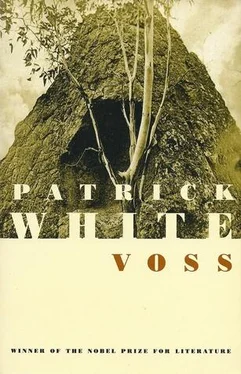Rose had come to work at Bonners’ only after she was freed. The merchant would not have employed a convict, as a matter of conscience, and on account of petty thefts. If they are free, he used to say, there is a chance that they are innocent; if they are not free, it is taken for granted that the assigned servant is to blame.
Free or restrained, it was the same to Rose. Fate, her person seemed to suggest, had imposed far heavier, far more dreadful, because invisible, chains. This did not affect her constitution, however. Though shackled, she would work like an ox. When Mr Bonner was laying out the rockeries that afterwards became so nice, she was carrying baskets of earth and stone, and leaving her heavy imprint on the original sand, while Jack Slipper and the lad were grumbling, and dragging and leaning, and even disappearing. Rose was not compelled to lend herself to heavy labour. Nor to sit up. Yet, there she was, when the young ladies went to balls, or lectures, or musical evenings, as they frequently did, she would be sitting up, her heavy chin sunk in her bosom, with her hands pressed together, almond-shape, in her great lap. Then she would jump up, still glittery from sleep, without smiling, but pleased, and help the young ladies out of their dresses. She would brush Miss Laura’s hair, even when the latter did not wish it.
‘Go now, Rose,’ Miss Trevelyan would say. ‘That is enough.’
But Rose would brush, as if it were her sacred duty, while her mistress remained a prisoner by her hair.
Because she was ugly and unloved, Rose Portion would attempt to bind people to her in this way. Yet Laura Trevelyan could not begin to like her maid. She was kind to her, of course. She gave her presents of cast-off garments and was careful to think about her physical well-being. She would make a special effort to smile at the woman, who was immediately grateful. Kindness made her whole body express her gratitude, but it was her body that repelled.
So it was, too, in the case of Jack Slipper, that other individual , as Mr Bonner almost always referred to him after the man had been sent away. Of undisclosed origin, the latter had performed odd jobs, scoured the pans and beat the carpets, worked in the garden although it was distasteful to him, and even driven the carriage at a pinch, in improvised livery, when Jim Prentice was down with the bronchitis. But whatever duties were allotted to him, Jack Slipper had always found time to loiter in the yard, under the lazy pepper trees, scratching his armpits, and chewing a quid of tobacco on the quiet. So Laura would remember, and again see him spit a shiny stream into the molten laurels. He used to wear his sleeves cut back for greater freedom, right to the shoulder, so that in his thin but sinewy arms the swollen veins were visible. He was all stains, and patches of shade, and spots of sunlight, if ever Laura was compelled to cross the yard, as, indeed, sometimes she was. It must be admitted he had always acknowledged her presence, though in such an insolent and familiar manner that invariably she would turn the other way on confirming that the man was there. Jack Slipper ended in the watch-house. The rum was his downfall. The night they took him up, you could have lit the breath upon him, they said. So he received a sentence. Mr Bonner went down and spoke to him, telling him it was his habit to stand by those he employed, but seeing as he did not care for Jack’s behaviour, he would have dismissed him, even without sentence being passed. The fellow only laughed. He wiped his hairy nose with his wrist, and said he would have gone, anyway.
So that was the end of Jack.
But Rose remained, her breasts moving in her brown dress. Laura Trevelyan had continued to feel repelled. It was the source of great unhappiness, because frequently she was also touched. She would try to keep her eyes averted, as she had from Jack Slipper. It is the bodies of these servants, she told herself in some hopelessness and disgust, while wondering how her aunt would have received her thoughts, if spoken. Similar obsessions could not have haunted other people. I will put all such things out of my mind, she decided; or am I a prig? So she wondered unhappily, and how she might correct her nature.
Now, when this calamity had felled the unfortunate Rose, Laura Trevelyan was more than ever unhappy. As life settled back, and the things were removed from the dining-table, and the smallest pieces of the Waterford salt-cellar had been recovered, she held herself rigid. Nobody noticed, however. Because she was practised in disguising her emotions, only someone with more than eyes in their head would have seen.
Aunt Emmy did not, who was holding a pretty but useless little handkerchief to her troubled lips. Aunt Emmy said:
‘Now, girls, this is something between ourselves, most emphatically. It is providential that the dining-room does not communicate directly with the kitchen, so that Cassie and Edith need not suspect. Mr Bonner must be told, of course, and will perhaps offer a helpful suggestion. Until then — nothing.’
‘We have forgotten the Pringles’ picnic, Mamma,’ said Belle, who was hearing the grandfather clock strike.
No event was so disastrous that Belle could not recover from it. She was still at that age.
Her mother began to suck her teeth.
‘Dear, yes,’ she said. ‘Mrs Pringle will be provoked. And the carriage is for half past, if Mr Prentice can rouse himself. Rose,’ she called, ‘ask Edith to run across to Jim, and remind him to bring the carriage round. Dear, we shall be late.’
Going at once to change her dress, Laura Trevelyan regretted all picnics. A strong day was bending the trees. The garden was a muddle of tossed green, at which she frowned, patting a sleeve, or smoothing hair. Most days she walked in the garden, amongst the camellia bushes, which were already quite advanced, and the many amorphous, dark bushes of all big hospitable gardens, and the scurfy native paperbarks. At one end of the garden were some bamboos, which a sea-captain had brought to Mr Bonner from India. Originally a few roots, the bamboos had grown into a thicket, which filled the surrounding air with overwhelming featheriness. Even on still evenings, a feathery colloquy of the bamboos was clearly audible, with sometimes a collision of the stiff masts, and human voices, those of passers-by who had climbed the wall, and lay there eating pigs’ trotters, and making love. Once Laura had found a woman’s bonnet at the foot of the bamboos. A tawdry thing. Once she had found Rose Portion. It is me, miss, said her servant’s form; it was that airless in the house. Then Rose was pressing through the thicket of bamboos. On occasions the night would be full of voices, and unexplained lights. The moist earth was pressed at the roots of the bamboos. There were the lazy, confident voices of men, and the more breathless, women’s ones. I have give you a fright, miss, Jack Slipper once said, and got up, from where he had been propped upon his elbow beside the darkness. He was smoking. Laura had felt quite choked.
Now this young woman was holding her hands to her head in the mirror. She was pale, but handsome, in moss green. If Laura had more colour, she would be a beauty, Aunt Emmy considered, and advised her niece always to drop her handkerchief before entering a room, so that the blood would rush to her cheeks as she stooped to pick it up.
‘Laura!’ called Belle. ‘The carriage is here. Mamma is waiting. You know what Mrs Pringle is.’
Then Laura Trevelyan shook her shawl. She was really handsome in her way, and now flushed by some thought, or by the wind which was assaulting the trees of the garden with greater force. There were the needles from trees falling through the window upon the carpet. There was the dry sighing of the bamboos.
Читать дальше












